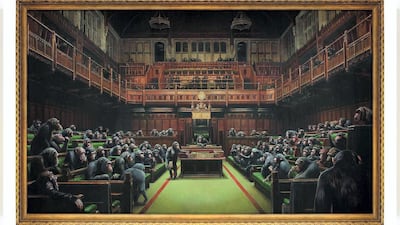Banksy is making the rounds again on social media, this time by depicting British members of parliament as a bunch of apes: hairy, unclothed, sitting on their haunches in the leather green banquettes of the House of Commons. The message, as with all of Banksy's work, is not subtle and it is even more relevant today, as the public turns against British Members of Parliament who are unable to resolve the self-inflicted mess of Brexit.
The anonymous artist made the painting, titled Devolved Parliament, in 2009. The fact it is still pertinent has only added to its prestige, and it's due to go on the auction block on Thursday, October 3 at Sotheby's London for an estimated £1.5 to £2 million (Dh7m to Dh9m).
Before you gasp at that amount, remember that for contemporary art, that's par for the course. Sales for contemporary artists range from the mid-hundred-thousands to the low millions, and Banksy's print, now titled Love is in the Bin, sold last year for £1.13m — and that was before it shredded itself. Devolved Parliament is no doubt getting a bump from that well-publicised spectacle.
What people love about Banksy is his adversarial stance towards the art world, a realm that most people think is rubbish. The first appearance of chimpanzees in his work, Laugh now, but one day we'll be in charge (2002), appeared in an exhibition titled Banksy vs. Bristol Museum, and you don't get much clearer than that. No wonder few art museums have staged any Banksy shows, and no wonder Banksy has agreed to few of them. Banksy, a pseudonym for a still-anonymous artist, started with street art and has remarkably maintained his credibility, even after selling his work for millions via galleries and major auction houses.
The art world returns the favour
The problem is no one could hate the art world more than it already hates itself. Art-world bashing is a regular sport among art professionals, from the obligation to attend free dinners (you would not think this is a problem, but it seems so) to a squeamishness around selling one's work at all. In the 1970s, artists took to literally tearing down the walls of the gallery, exposing their dealers in plain view: the business of art is the real work, they said. And despite this hostility towards the powers of commerce, these works too were bought and entered the canon.
More recently, as demonstrated by the disputes over museum funding, the art world also bitterly knows the hypocrisy between its liberal stance and its close relationship to the hyper-wealthy, whether as buyers or as sponsors. Exhibition organisers have long turned to corporations for sponsorship — such as tobacco sellers Philip Morris, and latterly to individuals, such as Warren B. Kanders, whose Safariland tear-gas canisters were used against Palestinians in the West Bank, or the Sacklers, the family behind Purdue Pharma, the dominant manufacturer of prescription opioids in the US. The connection of these funders to museums is the subject of artworks, public debates, innumerable texts, and a pyramid of PhDs in the waiting: you can't tell the art world something it doesn't already know.
So, Banksy, enough with the hostility towards the art world: we already agree with you! We'll back you on Devolved Parliament, but it would be nice if recognition of politicians' own crippling ineptitude would dawn on the UK political world.


